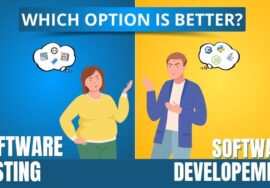
What python is used for? Exploring the Versatility and Applications Of Python
Python, a high-level programming language, has rapidly become one of the most widely used and versatile languages in the world of technology. Its simplicity, readability, and powerful capabilities make it an ideal choice for an array of applications. From web development to data analysis, and scientific research to artificial intelligence, Python’s versatility knows no bounds. In this article, we will delve into the various realms where Python finds its application, highlighting its significance and impact in each domain.
1. Web Development
Python’s ease of use and extensive libraries have made it a favored choice for web development. Frameworks like Django and Flask provide the tools to create dynamic and interactive web applications quickly. With clean syntax and robust security features, Python simplifies the process of building everything from simple websites to complex web platforms.
2. Data Science and Analysis
Python’s prominence in the field of data science is unparalleled. Libraries such as NumPy, Pandas, and Matplotlib offer comprehensive support for data manipulation, analysis, and visualization. This has contributed to Python’s dominance in tasks like data cleaning, statistical analysis, and machine learning implementation.
3. Artificial Intelligence and Machine Learning
Python’s rich ecosystem of machine learning libraries, including TensorFlow, PyTorch, and scikit-learn, has revolutionized the field of artificial intelligence. Its flexibility, combined with extensive community support, enables researchers and developers to create advanced AI models for image recognition, natural language processing, and more.
4. Scientific Computing
Python has gained traction in scientific computing due to its ease of use and integration capabilities with other scientific libraries. Researchers across various domains use Python for simulations, data analysis, and visualization in fields like physics, biology, chemistry, and astronomy.
5. Automation and Scripting
Python’s scripting capabilities have made it a go-to language for automating repetitive tasks. Its ability to interact with operating system functionalities and other software allows users to streamline processes, manage files, and perform various system-related actions effortlessly.
6. Internet of Things (IoT)
Python’s lightweight nature and compatibility with microcontrollers make it a prime candidate for IoT projects. Its support for hardware interfaces and protocols simplifies the development of IoT applications, from smart home devices to industrial sensors.
7. Game Development
Though not as conventional as some other languages, Python is used in game development due to its ease of use and availability of game development frameworks like Pygame. While not suitable for high-end graphics, Python is a great choice for developing 2D games and prototypes.
8. Education
Python’s simplicity and readability have made it a popular choice for teaching programming to beginners. Its clear syntax helps novices grasp programming concepts without getting bogged down in complex syntax rules.
9. Financial and Quantitative Analysis
The finance sector leverages Python for quantitative analysis, risk assessment, and algorithmic trading. Libraries like QuantLib and Pandas help professionals analyze financial data and develop predictive models for investment strategies.
10. Natural Language Processing (NLP)
Python’s extensive libraries, such as NLTK and spaCy, have played a pivotal role in the development of natural language processing applications. From sentiment analysis to language translation, Python’s NLP capabilities are transforming communication between humans and computers.
11. Image and Video Processing
Python’s libraries, including OpenCV, enable developers to process and manipulate images and videos. This is applied in various fields, from medical imaging to video editing.
Conclusion:
In the ever-evolving landscape of technology, Python stands out as a versatile programming language with a wide range of applications. Its simplicity, combined with an extensive collection of libraries and frameworks, empowers developers to bring their ideas to life across domains as diverse as web development, data science, artificial intelligence, and more. As Python continues to evolve and adapt to new challenges, its impact on various industries is likely to grow, solidifying its position as a cornerstone of modern programming. Whether you’re a beginner taking your first steps into programming or an experienced developer tackling complex challenges, Python offers a robust platform to explore, innovate, and create.
Interested in learning Python Course. Join the Upsurge Infotech Course today.












